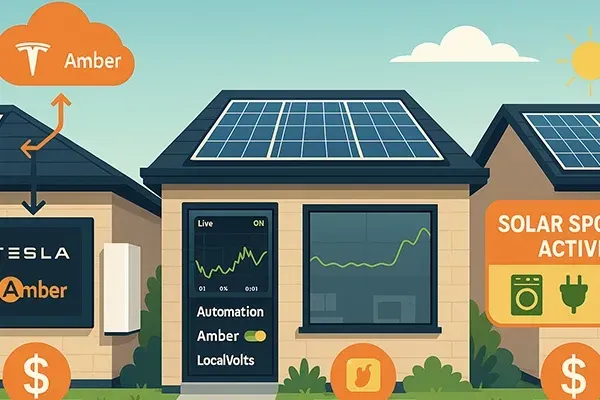
Virtual Power Plants vs Energy Automation
Should You Join a VPP or Go DIY with Your Battery? Here's the Real-World Lowdown
If you’ve got solar and a battery—or you’re thinking about it—you’ve probably seen the term “VPP” floating around.
Maybe your energy provider pitched you one. Maybe a neighbour mentioned it. Maybe you're wondering if you even need one.
Here’s the thing: there’s more than one way to get the most out of your battery, and not all of them involve giving up control.
In fact, there are three solid strategies you can follow right now—and each works a little differently depending on your home, your habits, and your goals.
Let’s break them down.
⚡ Option 1: Join a VPP (Virtual Power Plant)
What’s a VPP?
A Virtual Power Plant links your battery with thousands of others so your energy retailer can call on them like one giant power station. When the grid needs help, they discharge your battery—then reward you with bill credits or better rates.
Think of it like renting out your battery… while still using it most of the time.
Popular options in Australia include:
Tesla Energy Plan
Energy Locals (a great choice with flexible plans and fair pricing)
👉 Check out Energy Locals here
Good if you:
Don’t want to manage anything
Are happy to trade a little control for rewards
Want to feel like you're “part of the grid solution”
🧠 Option 2: Go DIY with Smart Automation
If you're the kind of person who wants to squeeze every last drop of value from your battery—this is your lane.
With smart energy tools like Amber Electric or LocalVolts, and automation via the Jousto Energy Hub, you can:
Buy electricity when it's cheap (like, really cheap)
Store it in your battery
Use it when prices spike
Automate your hot water, EV charging, or big appliances around that
That’s what we call energy arbitrage—buy low, use high, and let tech do the heavy lifting.
📚 Curious? Here's our full explainer →
Good if you:
Love value and control
Like the idea of beating the market
Are keen to run your home smarter, not harder
⏱️ Option 3: Use a Time-of-Use Tariff + The Solar Sponge
This is the “easy wins” strategy we wish more people knew about.
Many Aussies are already on Time-of-Use (TOU) tariffs—where power is:
Super cheap during the middle of the day (thanks to solar sponge pricing)
Most expensive in the evening peak (4–9pm)
With smart scheduling, you can:
Run your hot water, dishwasher, and EV charging during solar sponge hours
Charge your battery from solar or cheap grid energy
Use that stored energy during the pricey peak window
No wholesale markets. No VPP rules. Just automated savings that stack up over time.
And here’s the good news: the Jousto Energy Hub works beautifully with TOU plans.
It can:
Automatically detect off-peak and sponge windows
Charge and discharge your battery for max savings
Help you plan your energy usage around pricing—without you lifting a finger
Want to keep your current energy provider and just get smarter about how you use energy? This is your strategy.
👉 Energy Locals also supports TOU with fair rates and great solar support:
Check them out here
🔍 So Which One Should You Choose?
Let’s keep it simple:
StrategyYou’re a good fit if…VPPYou want to “set and forget” and earn rewardsEnergy AutomationYou want control + max value, powered by techTOU + Solar SpongeYou want low-maintenance savings and flexibility
There’s no wrong choice. It’s just about what fits you best.
And whichever route you go, Jousto makes it easier.
🤝 Let Jousto Help You Make the Most of Your Battery
Whether you're joining a VPP, going full DIY with Amber, or just getting smarter on a TOU plan—Jousto Energy Hub is your friendly co-pilot.
It helps you:
Schedule energy use
Optimise your battery and appliances
Stay in control—while doing less
